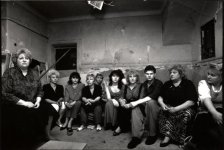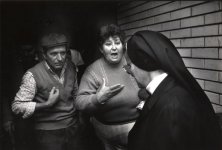'Flash' (the word itself betrays violence) is not an option.
A photographer doesn't actively participate in a violent outburst of artificially-generated light; a photographer makes do with what light is there, as it is there, in the manner in which it is there, satisfactory or not from the point of view of convenience...
Photography comes from the Greek for "writing with light."
In the realm of documentary and photojournalism, the photographer's first duty is to record reality, as it exists and as it can be seen. Natural light is preferable. But sometimes natural light must be assisted in order to honestly capture and preserve the image. Sometimes the camera cannot see what the human eye can, at the moment it can be seen.
Photography seems natural but has many artifical qualities. It solidifies fluid, fleeting motions that exist for just 1/1000th of a second. Lenses isolate a thin plane of sharp focus whereas the human eye -- whose area of focus at any moment is actually equivalent to a 135mm lens -- is constantly sweeping and processing the image over a much larger area to create a living tapstry of a scene. Photographers marvel at "creamy" out of focus areas in their lenses, but those of us who require eyeglasses to see near or distant objects know that nature's Bokeh is harsh, jagged and distorted, with clumped, spoked highlights as our brains seek to apply a biological "unsharp mask" to that that which cannot be sharpened.
Flash has its place in serious photography, and it's not more artificial, I would argue, than a tripod -- and, for rangefinder photography, less intrusive and more practical.




